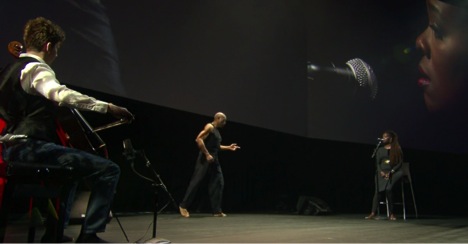[3] The Red Circle and the Blue Curtain

...spontaneity—the notion that creativity comes from a deep interior region...
—Bill T. Jones2
1
In my political theory intro course in the theater building, we were set to use dramatic improvisation to see what we might have overlooked in our reading of Machiavelli’s Prince. Each group of three students picked a chapter from the book to then interpret with small group movement. After each group went off to talk over what they would do, the performances began. The first group had chosen Chapter 12, on mercenary armies. The tallest of three students walked slowly downstage to the apron, with the other two students close on either side. He stopped and looked out to the audience. Abruptly, the other two attacked him and he ran wildly away. The second group chose chapter 7, intended for those new princes dependent on fortuna. The three students formed a ring and circled, faster and faster, until, one after another, they all fell down. The third and last group had chosen Chapter 26, the “Exhortation to Liberate Italy from the Barbarians.” They huddled in the center of the stage, paused, and then rushed away in different directions, waving their arms in the air and crying out, “O, Italia, prenderà l’arme, prenderà l’arme!”
no messages here
but ones twirling to the music
describing dance’s
essence, embodiments of
feeling inscribed in the air
words by convention
only mean something to us
because we’ve agreed
to call this an “apple,” that “hope”
but don’t just stand there and wave
dance to the music
and forget the sentences
oh, what a wild leap!
then he curled round on himself
sprung up: Hocksprung mit Musik
2
Bill T. Jones’s performance Analogy/Ambros: The Emigrant was meant to present W. G. Sebald’s long chapter “Ambros Adelwarth” from his novel The Emigrants. Now, you don’t have to think too hard about it to realize that dance doesn’t exactly “mean” anything but itself. Jones’s dancers rushed around the stage, ducked in and out of large panels, with doors and windows cut out of them, which some of the dancers lifted and twisted and turned in the air, while other dancers paired like a chæur dansé or leaped and turned and rolled gracefully on the floor. A strange kind of music, partly live and partly recorded, gave the dancing un mannequin de couture to hang and fit itself upon. Then there were voices coming over the speakers, and Bill T. Jones was reading aloud from Sebald’s book while a female voice was singing other less certain lyrics. We strained to hear what exactly was being said because it was all we had to give any definite “meaning” to the dancing.
a dance I thought up
also used cello and voice
but instead of Jones
dancing, Marques Haynes was dribbling
in circles round and round
Ambrose and Cosimo
dragged the hurt rags of their lives
all around the world
but were mainly disappointed
how nothing came up to snuff
Beyond the valley of Jehosphat, where at the end of time, it is said, the entire
human race will gather in the flesh, the silent city rises from the white limestone
with its domes, tower, and ruins.
—The Emigrants3
with each stab of pain
we strengthen our conviction
that this cannot be
the real world. something greater
must await us beyond life
3
The very idea of dance! “If you’re not dead, then you’re dancing,” the old man said. “You wake up, go out to the kitchen and make the coffee—carefully—measuring in the water and the coffee and turning on the burner.” He swung his legs out from under the covers and around to the floor and stood up. He walked purposefully, setting out slowly and then speeding up, into the kitchen, reached up for the coffee, down for the percolator, twisted the faucet and ran the water in, turned and faced the stove, twisted the knob, and watched patiently as the fire came up. He set the pot down on the fire, turned, and walked, again with great purpose, back to the bedroom. Such strange and mysterious movements. Was that Elvis on the radio?
what these graceful
gestures might possibly mean
you wake up and stretch—
an arm goes this way, a leg rolls
over as if to say—not yet
but you could make them
communicate an idea
with fingers and fists
meaning letters and numbers
or waving semaphore flags
his arm bent this way
right elbow tucked as he flies
past and lands rolling
O, God! it’s so expressive!
what can it possibly mean?
Bio: Charles D. Tarlton
